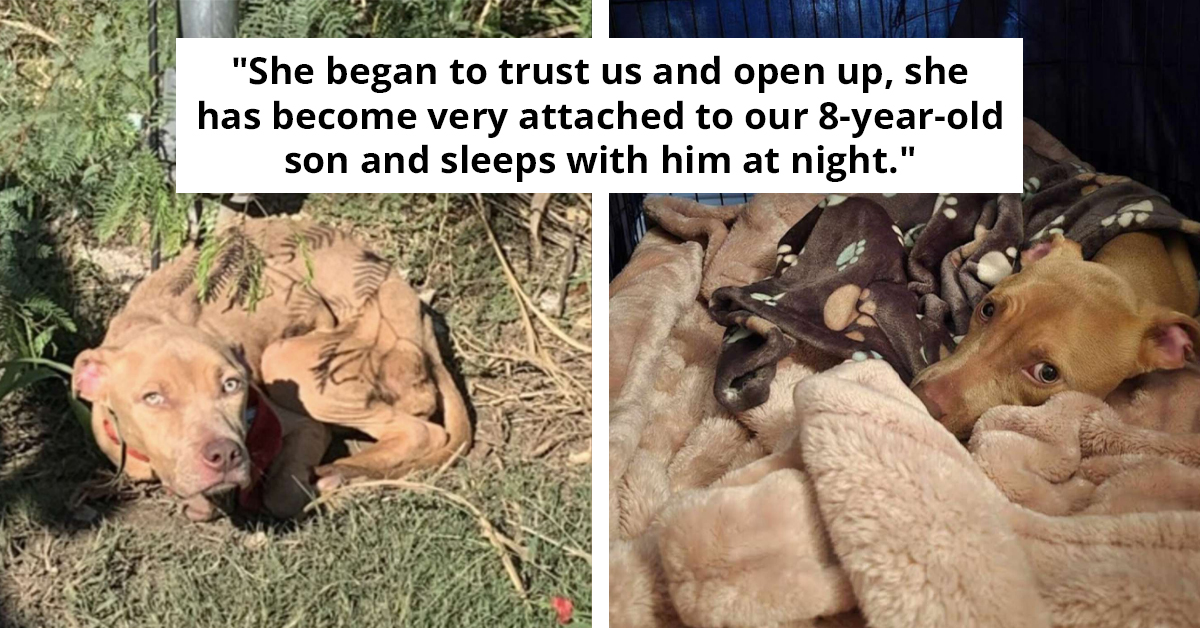Woman Refuses To Get Rid Of Her Dog For Her Transgender In-Law, MIL Terms Her The AH
Dedicated animal lovers have been known to take their dogs like children. And just like kids, a furry best friend can create a lot of conflict in a relationship.
Conflict involving pets may be quite disruptive, whether it's a quarrel over how to train a dog or a disagreement over how much care pets should receive. Your relationship doesn't necessarily have to fail because of a disagreement over pets, but it can necessitate some compromises on each of your parts.
Spend some time talking about your pet-related ideals when you're starting a new relationship. If you value having an indoor cat or dog that sleeps in your bed, you must make sure your partner does as well, or you run the risk of a tense relationship.
Never get a new pet without first talking to your partner and receiving their enthusiastic approval. If your relationship is already established, it's time to start speaking up and being honest.
But for the OP in today's story, her husband's sibling was the one who had a problem with her dog. The OP says that her husband's sibling, Jay, recently came out as trans, got divorced, and left their job, so they live with them.
The OP gets back one day, only for Jay to tell her to get rid of her dog. Read the entire story for yourself below.
The OP Writes

Toto is a 6 year old YorkiePoo and exceptionally well behaved and comes to work with the OP

Here are some of the most upvoted comments from redditors for you to read through below

Navigating Family Dynamics
This situation reflects complex family dynamics where emotional needs and personal boundaries often clash. According to research published in the Journal of Family Psychology, family members frequently struggle to balance their own needs with the expectations of others.
The woman's refusal to get rid of her dog highlights her emotional attachment, which may not align with her in-law's desires, creating tension.
Navigating Family Dynamics with Care
When a family member identifies as transgender, it can shift existing family dynamics, requiring thoughtful adjustments.
Research from the American Psychological Association indicates that families often struggle with acceptance, which can lead to conflict over traditional roles and expectations.
This situation exemplifies how differing needs can create tensions that challenge familial relationships.
Make sure Jay can't get rid of the dog when you're not around

Jay should go and live with the mother

MIL should let Jay move in with her

Understanding that different family members can have varying thresholds for conflict is crucial. Research indicates that individuals often react defensively when they feel their needs are not being acknowledged, which could explain the in-law's strong reaction.
This defensive response may stem from past experiences of feeling neglected or unworthy within familial relationships.
Emotional responses to changes in family dynamics can be complex and multifaceted.
Studies on familial acceptance reveal that fear of the unknown and entrenched beliefs can trigger defensive reactions among family members.
In this case, the mother-in-law's reaction may stem from her discomfort with the changes, leading to a critical stance toward the woman's pet ownership.
What they ask is totally unreasonable

This is a disgusting behavior on Jay's part
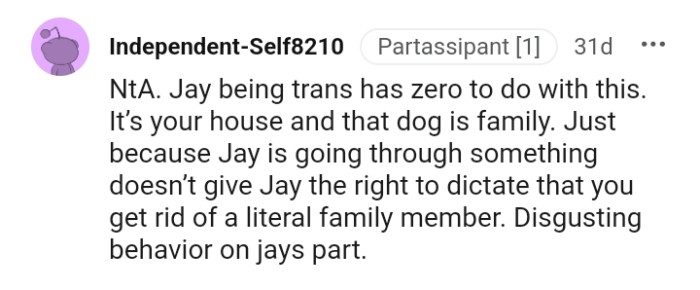
I wonder what the society producing means too

The Role of Empathy in Conflict
Empathy is vital in navigating conflicts, especially within families. Research from the American Psychological Association shows that empathetic communication can mitigate misunderstandings and foster healthier interactions.
Encouraging empathy can help both the woman and her in-law understand each other's perspectives, which may lead to a more constructive dialogue.
Understanding Resistance to Change
Research in social psychology highlights that resistance to change is a common human response, especially in familial contexts.
Dr. Kurt Lewin's change management theory posits that individuals often feel threatened when their norms are challenged, leading to defensive behavior.
In this scenario, the mother-in-law's criticism might reflect her struggle to adapt to new family dynamics rather than a personal attack on the woman.
Jay is going through such a difficult life transition

Jay must be going through a lot right now

It doesn't demand that other people change their lives

Implementing family meetings to discuss concerns and establish boundaries can be a helpful approach. Open discussions about emotional needs and responsibilities can prevent feelings of resentment from building up.
Studies highlight that regular communication within families can lead to better emotional regulation and stronger relationships.
Creating a dialogue that centers on empathy and understanding can help ease tensions in such situations.
Studies show that family therapy can facilitate these conversations, allowing all parties to express their feelings openly and without judgment.
By fostering a supportive environment, families can navigate these changes more effectively and with compassion.
They need to politely approach you

Jay sounds a bit spoiled and self centered

He's burning all his bridges with a torch

Understanding Attachment Styles
Attachment theory provides valuable insight into how family members relate to one another. Individuals with secure attachment styles are generally more adaptable and understanding, while those with insecure styles may react more defensively.
This dynamic could explain the in-law's reaction; understanding these differences can pave the way for more compassionate interactions.
Strategies for Healthy Family Discussions
To address conflicts regarding pets and family dynamics, establishing clear communication strategies is vital.
Research indicates that using 'I' statements can help individuals express their feelings without placing blame, leading to more constructive conversations.
In this case, the woman could express her feelings about her dog in a way that fosters understanding and reduces defensiveness from her mother-in-law.
I've never heard of that phrase before too

You and your husband may have to discuss kicking him out
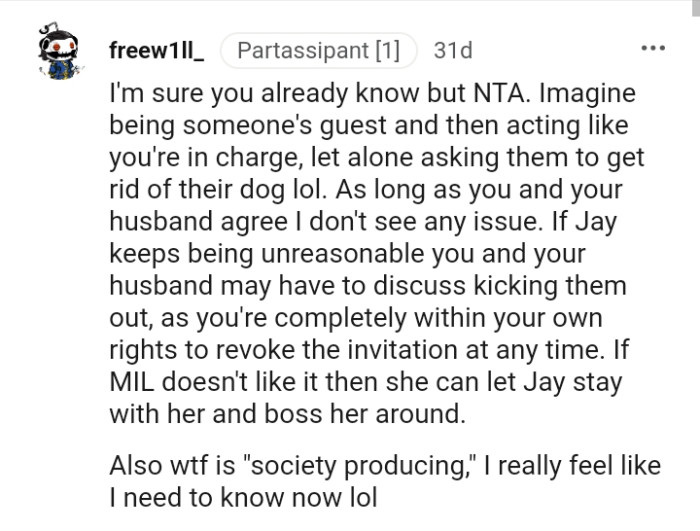
A dog is a family member

Your dog has absolutely nothing to do with Jay's transition

Jay really has some nerves

Pets are there for you all the time
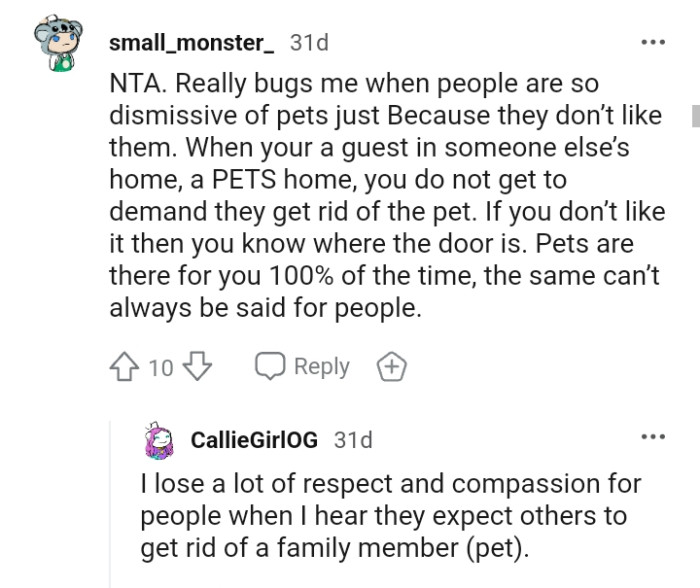
They can stay somewhere else if they can't handle it
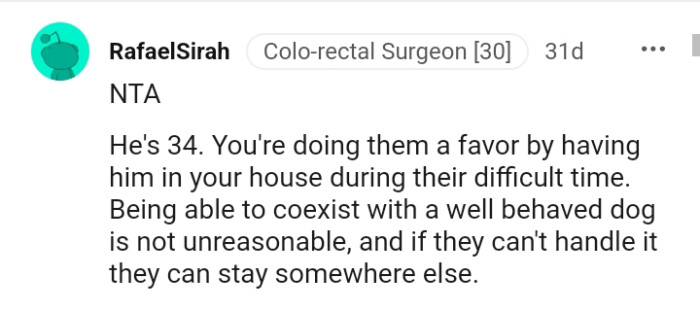
Getting clear about the issue when there is a dispute over pets will help you come up with a solution. But this case is quite different, and as Redditors put it, the dog was in the house first before Jay wandered in.
So they supported the OP, and she got the "not the AH" verdict. Leave your thoughts about this story in the comments and share this post as well.
Psychological Analysis
This situation highlights the challenges families face when adapting to changes in identity and relationships. The emotional reactions involved often indicate deeper struggles with acceptance and understanding.
Facilitating open conversations can help bridge gaps and foster compassion among family members.
Analysis generated by AI
Analysis & Alternative Approaches
Navigating the complexities of changing family dynamics, particularly regarding gender identity, requires empathy and open communication.
Research emphasizes that fostering understanding can mitigate tensions and strengthen familial bonds.
Ultimately, creating a safe space for dialogue is essential for resolving conflicts and promoting acceptance.
Analysis & Alternative Approaches
By fostering empathy and open communication, families can navigate conflicts arising from differing emotional needs and expectations. Such approaches can lead to healthier family dynamics and improved emotional well-being for all involved.



